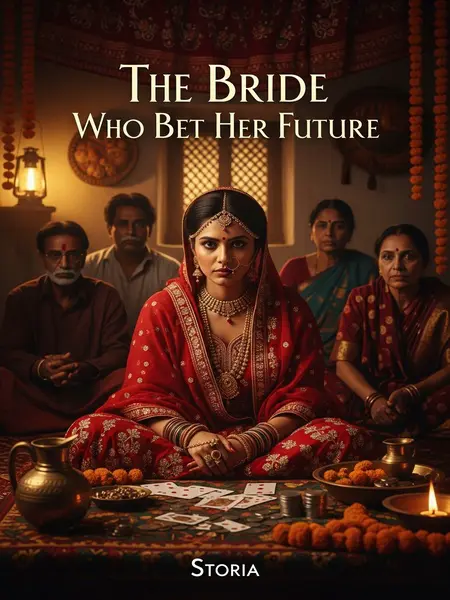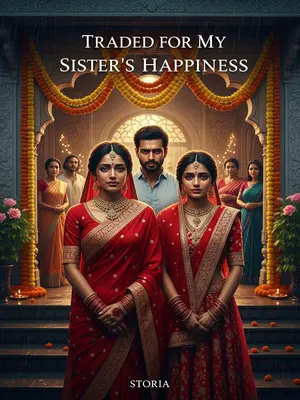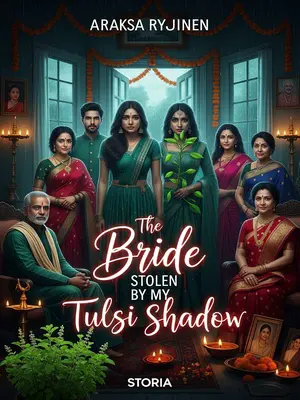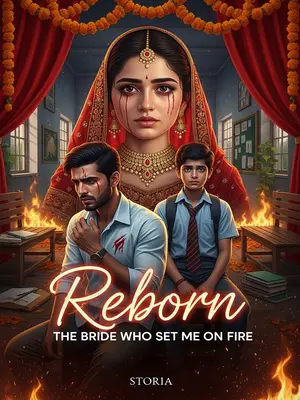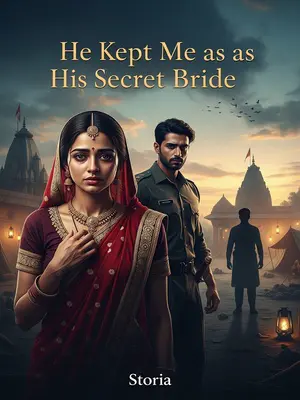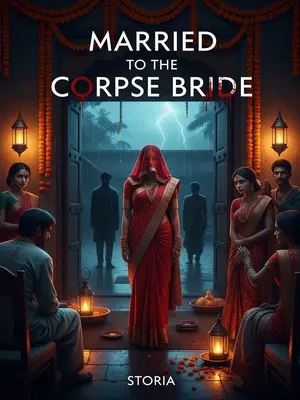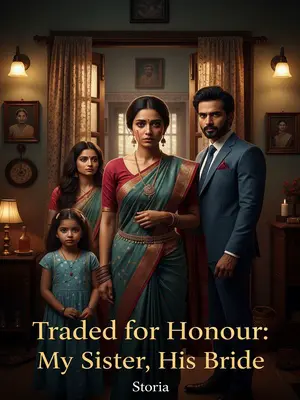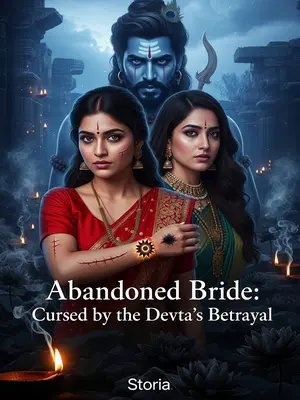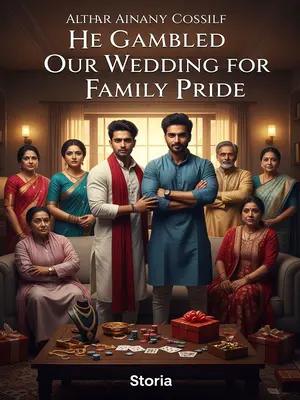Chapter 1: The Wedding Banquet
Halfway through the wedding banquet, the air thick with the clang of steel plates and the whirring of the old ceiling fan overhead, my half-drunk husband was led away by a chorus of boisterous relatives. Outside, the distant crackle of children bursting crackers mingled with the band’s dhol beats and laughter, anchoring me right in the heart of my village’s wedding madness.
Inside the tent, the aromas of mutton curry and fried onions drifted from the kitchen, weaving through the chatter of cousins. I took a deep breath, tugged the pleats of my red silk saree into place, and tucked a stray gajra back into my hair, praying that no one would notice the worry flickering across my face. After all, today was meant for celebration, not concern.
Less than two hours later, Mausi sidled over, clutching her saree’s pallu and glancing over her shoulder at the gossiping aunties. Half-whispering, she said, “Suno, tumhare pati ne toh aaj kaafi haath se nikal diya hai.” Her tone was half-worried, half-amused, making me freeze mid-command as I told my cousin to fetch more jalebis for the guests.
It was my wedding day in my own village—how much could he really lose at cards? This wasn’t some filmi Delhi hotel where people gambled fortunes. Here, the biggest excitement was a new borewell or the weekly haat. Surely, it couldn’t be more than a few hundred, maybe a thousand or two. Was Mausi just teasing?
Curiosity—and a growing sense of dread—pushed me to the card room. I found my husband slumped at the table, teetering between laughter and tears.
The card room was a cramped spare bedroom with plaster peeling off the walls, the lone tubelight buzzing and flickering overhead. My husband’s tie hung loose over his kurta, which was already wrinkled from the evening. A glass of cheap whiskey threatened to spill by his elbow, surrounded by empty Thums Up bottles and half-eaten samosas. His eyes, usually sharp, were now glazed and restless.
On the table, the familiar green chips—worth ten rupees each—were gone, replaced by unfamiliar red ones that glinted under the harsh light like a warning. The smell of beedi smoke hung heavy, and as I stepped in, the lively chatter faded to a hush.
I picked up one of the red chips. The number on it stared back: "Ten Thousand." For a moment, my knees threatened to give way. My heartbeat thudded in my ears, and my mother’s warning about card games at weddings flashed through my mind.
My heart skipped a beat. The average salary here is less than twenty thousand a month. There’s not even a proper supermarket in town—how could they be gambling ten thousand per hand?
I tried to laugh it off, telling myself it must be a joke, like children playing at being kings and queens. But my stomach churned with dread, memories of Dadi’s stories rising up—men who gambled away land, gold, peace, all for a single moment of show-off.
My husband was hemmed in by a circle of men, his face flushed, cigarette smoke swirling, both eyes fixed on the cards.
Some men lounged cross-legged on the charpai, others perched on borrowed stools. The heavy curtain drawn across the window barely kept out the winter chill, but inside, the air was hot with tension and whiskey. My husband watched the cards as if nothing else in the world existed, blind to the chaos brewing.
They were playing Teen Patti—three cards each, stakes climbing with every round.
The slap of cards, shuffling, sharp breaths before every bet—these were the sounds of every village gathering, as familiar as gully cricket. But today, the air was thick with something else—danger, greed, something more pungent than the chicken curry simmering nearby.
Across from my husband sat Chacha ji, Mausi, cousin Vikram, Dadaji’s brother, and Daulat from next door. They all looked up as I entered, pretending to be engrossed in their cards, but I caught the guilt flickering in Mausi’s eyes and the sly smirk on Chacha ji’s lips. Daulat fussed with his collar, not meeting my gaze. Vikram winked, as if it was all just a harmless joke.
A second ring of onlookers had formed outside the door—uncles, aunties, cousins, even little kids craning their necks for a peek. Someone giggled, someone whispered, “Damaad ji toh aaj phas gaya.” It seemed the whole mohalla knew before I did.
Forcing a smile, I said, “Arjun, Mummy and Papa bula rahe hain. Baad mein khel lena.” My hand trembled as I placed it on his shoulder, bangles clinking. I gave his sleeve a gentle tug, hoping he’d sense my urgency without making a scene in front of everyone.
He squinted at me, shook his head, and slurred, “Abhi toh jitna hai, woh wapas jeetna hai.”
He waved me off, stubborn as a buffalo on the road. His face was a strange mix of pride and desperation, cheeks flushed with whiskey and shame.
“Win back what? Losing a little money to relatives is shagun. Whatever you lost, main de dungi.”
I tried to keep it light, tossing in a teasing smile, hoping to ease the tension. Under the table, I squeezed his hand, wishing he’d come to his senses.
He curled his lip and ignored me, shouting at Chacha ji to deal the cards.
He shrugged me off, focus snapping back to the game. Someone in the crowd whistled. My face burned, but I bit back my embarrassment.
“Chacha ji, kitna haar gaya hai?” I demanded, my voice firm, daring him to lie.
Chacha ji just gave a little shrug, eyes avoiding mine, shuffling the cards with the ease of long practice.
Anger bubbled in me. I slapped my husband’s shoulder. “Chalo, ghar chalo!”
The smack echoed in the room. My bangles sang out, and a few old aunties poked their heads in, hungry for drama.
But he just repeated, “Jeet ke aata hoon.”
He was like a stubborn child, voice sulky. He wouldn’t even look at me. I saw the hurt, the shame, and a wild, reckless hope that luck would turn.
I grabbed him by the collar, trying to drag him up. Only then did Chacha ji and the others move to stop me.
My bangles clinked as I tried to pull him to his feet, but the men intervened. Chacha ji raised a hand, “Bas, beta, shaanti rakho.”
“He doesn’t come home often. Let him play a bit. Jeet-haar toh kismat ka khel hai, beta. Aaj nahi toh kal sab barobar ho jaata hai. Why be so strict?”
His voice dripped with fake sympathy. The others nodded, eyes shining with anticipation. The message was clear: let men be men. I ground my teeth, thinking, ‘Hamesha yahi hota hai.’
It’s true—everyone knows my stubbornness. My parents always said, “Hamari beti mein aag hai.” I remembered every fight I’d won—at work, in college, at home. Only those who truly cared saw me bend.
My husband was that person—gentle, never raising his voice, always trying to make me laugh. Marrying him was like finding my own reflection. My heart softened, even as anger simmered.
In my distraction, my husband slipped back to the table, crawling into his seat like a scolded schoolboy. The others snickered. I glared at him, sharp as a knife.
“Chacha ji, abhi toh shaadi hi khatam hui hai. Itne kaam baaki hain. Next time, khel lena jitna marzi,” I tried again, half-pleading, half-reasonable. My mind was ticking off chores—returning plates, seeing off bandwalas, collecting gifts before some chachi pocketed my pressure cooker.
Mausi spread her cards and sighed, “Arre, rehne do. Parivaar hi toh hai. Kya zabardasti?” Her gold bangles clinked as she gave me a half-hearted, apologetic smile.
My cousin piped up, “Chalo, gin lo sab. Mere paas 9 hai.”
Vikram counted chips, eyes glued to the pile. As if this was all routine.
“I have 11,” Chacha ji said, stacking chips with pride. The red chip flashed in his glasses.
“I only have 6,” Mausi added, emptying her hand with a resigned sigh.
“I have 7,” Daulat mumbled, barely looking up.
“I have 5,” Dadaji’s brother finished, voice low, detached.
Chacha ji tallied up. “Milke hue, 38. Dhanyavaad, damaad ji.”
His words were polite but final. Whispers broke out in the crowd. Someone let out a whistle, amazed.
